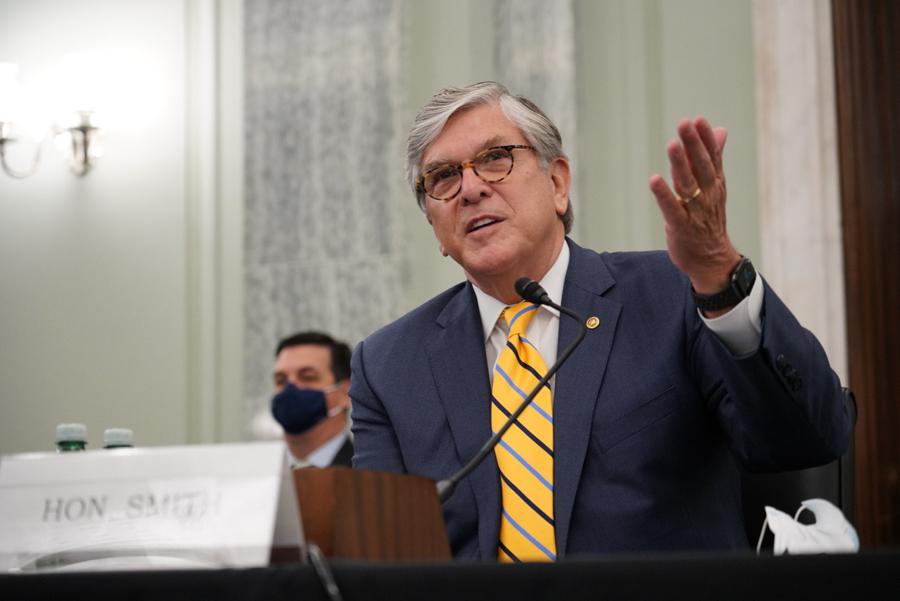NAB's Smith to Senate: Broadcasting Is Best Place for Vaccine Messaging
Makes pitch to receptive Senate Communications Subcommittee

The smarter way to stay on top of broadcasting and cable industry. Sign up below
You are now subscribed
Your newsletter sign-up was successful
National Association of Broadcasters president and CEO Gordon Smith told a Senate panel Thursday (April 15) why broadcasters are the best place for the Administration to spend its vaccine-promoting advertising message, which is backed by over $1 billion in COVID-19 aid funding.
Smith was testifying at a Senate Communications Subcommittee hearing, "Shot of Truth: Communicating Trusted Vaccine Information," on ways the media is disseminating vaccine information and what more TV, radio and online platforms can do.
Also Read: NAB Joins COVID-19 Collaborative
Broadcasters were praised by the senators for getting out accurate information, social media, not so much.
The April 15 hearing came only days after White House press secretary Jen Psaki said the administration was trying to connect with white, conservative communities —which overindex rural — with public service announcements on Discovery program Deadliest Catch, as well as working with NASCAR (which would mean money for Fox TV stations as well as cable) and CMT.
Smith said that the best way to use federal dollars to get credible information out to vaccine-hesitant populations, including white conservatives, is effective targeted broadcast advertising, particularly via small and local markets, which can “drive home the message better than any other medium.”
Also Read: Local Media Considered Best Source for Vaccine Reporting
The smarter way to stay on top of broadcasting and cable industry. Sign up below
Sen. Ben Ray Luján (D-N.M.), chair of the Communications Subcommittee, said the public is getting mixed messages from the media, including radio, TV and the internet, which was one of the reasons behind the hearing. The senator said one of the keys to getting people vaccinated is getting them that information from trusted sources.
President Joe Biden's American Rescue Plan has set aside $1 billion for the vaccine public education effort.
Smith said that when an issue like the Johnson & Johnson vaccine pause, broadcasters' job is to simply give the public the facts, with no spin, and no political theater. He pointed out that while broadcasters have been singled out as the most trusted news source, social media was at the bottom of the list. He also said a local and regional approach with broadcasting a key element was better than a "one-size-fits-all national approach.
Sen. Amy Klobuchar (D-Minn.) said she was frustrated by local news reporting things accurately, but then ”crazy things“ get reported on the internet. She pointed out broadcasters could not air total lies without regulatory problems. She said broadcasters could use help versus Big Tech, which is why she is sponsoring a bill to allow content producers to collectively negotiate with social media giants.
Smith thanked her for the bill, and said it should be obvious that people are struggling to find out where the facts can be found, which is broadcasting, but that journalism isn't free, and social media’s domination has meant that those platforms put broadcast content on their platforms and sell ads around it, ads that broadcasters aren’t getting on their airwaves. Klobuchar said she would continue to push for her bill.
Asked by Klobuchar how best rural areas could be reached, Smith said Congress needed to use all the tools in the toolbox and that the best tools to reach the most people with the best info was TV and radio.
Klobuchar said social media was a major source of antivaccine information. She has been pushing for new antitrust laws to get at the conduct of those major tech players, and added vaccine disinformation to her list of grievances. “I just can’t help but think that the biggest companies the work has ever known [Facebook and Twitter, for example] can't find some way to deal with this [disinformation],“ Klobuchar said.
Luján, in a follow-up question, pointed to the lack of diverse media ownership and suggested it was hard to have diverse public health messaging campaigns without diverse media ownership. Given Smith’s testimony about broadcasters being the most trusted source of such messaging, he asked Smith if NAB Congress and the FCC encouraging diverse media ownership.
Smith responded that Congress could incentivize diverse ownership using the minority tax certificate, which Congress ended — due to some abuses — but should have mended, he said. “You can do it with a stick,” he said, “but it is better with a carrot.” The “carrot” in the tax certificate was the tax break media companies got for selling outlets to minorities.
Smith, who has announced he is stepping down from the NAB presidency at year's end, was saluted at the beginning of the hearing by Thune, who called him a valued and treasured colleague while Smith was a fellow senator (R-Ore.), said his role as head of NAB had been extraordinarily important. He called Smith a ”loud, clear voice and advocate for local broadcasters around the country,“ and an ”extraordinary leader.“
Also Read: NAB's Smith to Testify at Vaccine Info Hearing
Luján echoed the sentiment, saying everyone who had met Smith was a friend.
Sen. Jon Tester (D-Mont.) said broadcasters were going to miss Smith and that he had done a great job.
Contributing editor John Eggerton has been an editor and/or writer on media regulation, legislation and policy for over four decades, including covering the FCC, FTC, Congress, the major media trade associations, and the federal courts. In addition to Multichannel News and Broadcasting + Cable, his work has appeared in Radio World, TV Technology, TV Fax, This Week in Consumer Electronics, Variety and the Encyclopedia Britannica.

